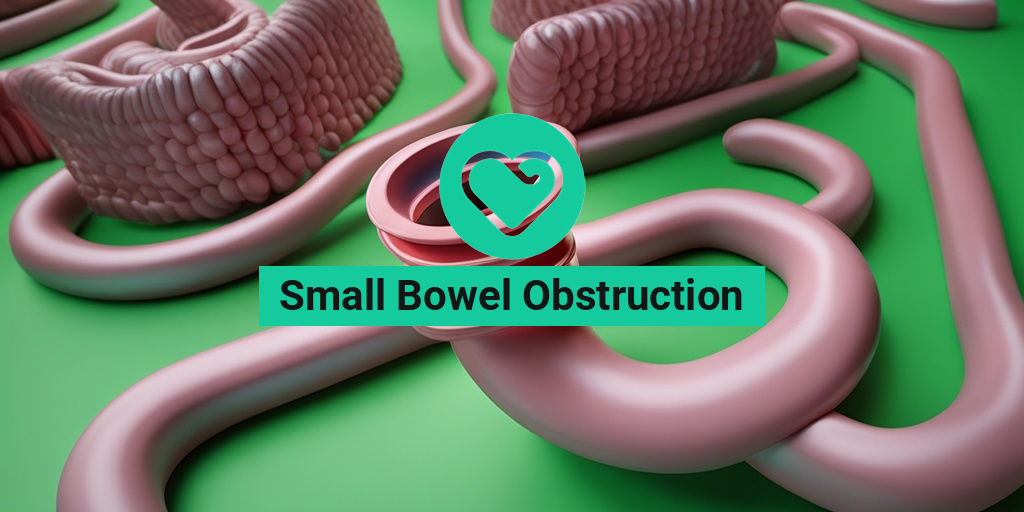What Is Small Bowel Obstruction?
Small bowel obstruction, also known as intestinal obstruction, is a serious medical condition that occurs when the small intestine (small bowel) becomes blocked, preventing food, fluids, and gas from passing through. This blockage can be partial or complete, and it can lead to severe complications if left untreated.
Causes of Small Bowel Obstruction
The most common causes of small bowel obstruction include:
- Adhesions: Bands of fibrous tissue that form between the small intestine and other organs, often as a result of previous surgeries or infections.
- Hernias: Protrusions of the small intestine through weakened areas in the abdominal wall.
- Tumors: Cancerous or non-cancerous growths that block the small intestine.
- Inflammatory bowel disease (IBD): Conditions like Crohn’s disease and ulcerative colitis that cause chronic inflammation and scarring in the small intestine.
- Twisting or kinking of the intestine: Abnormal twisting or kinking of the small intestine that blocks the flow of food and fluids.
Other less common causes of small bowel obstruction include gallstones, volvulus (twisting of the intestine), and intussusception (telescoping of the intestine).
Small Bowel Obstruction Symptoms
The symptoms of small bowel obstruction can vary depending on the severity and location of the blockage. However, common symptoms include:
- Severe abdominal pain: Cramping, sharp, or dull pain that can be constant or come and go.
- Nausea and vomiting: Vomiting may be frequent and contain bile or fecal matter.
- Abdominal distension: Swelling or bloating of the abdomen due to trapped gas and fluids.
- Constipation: Inability to pass stool or gas.
- Fever: Elevated body temperature, often accompanied by chills.
In severe cases, small bowel obstruction can lead to life-threatening complications, such as:
- Bowel ischemia: Reduced blood flow to the small intestine, leading to tissue death.
- Perforation: Rupture of the small intestine, causing peritonitis (inflammation of the abdominal cavity).
- Sepsis: Life-threatening infection that can lead to organ failure.
If you’re experiencing any of these symptoms, it’s essential to seek immediate medical attention. A healthcare professional can diagnose small bowel obstruction using imaging tests like X-rays, CT scans, or MRI scans, and develop an appropriate treatment plan.
Remember, if you have any concerns or questions about small bowel obstruction or any other health topic, you can always consult with a healthcare professional or visit reputable online resources like Yesil Health AI for evidence-based health answers 🏥.

Small Bowel Obstruction Causes and Risk Factors
Small bowel obstruction (SBO) is a serious medical condition that occurs when the small intestine is partially or completely blocked, preventing food and fluids from passing through. But what causes this blockage, and who’s at risk? Let’s dive into the common causes and risk factors of small bowel obstruction.
Common Causes of Small Bowel Obstruction
The most common causes of small bowel obstruction include:
- Adhesions: These are bands of fibrous tissue that can form between the small intestine and other organs in the abdominal cavity, causing the intestine to twist or kink.
- Hernias: A hernia occurs when a part of the small intestine bulges through a weakened area in the abdominal wall, which can cause a blockage.
- Tumors: Cancerous or non-cancerous tumors can grow in the small intestine and cause a blockage.
- Inflammatory bowel disease (IBD): Conditions like Crohn’s disease and ulcerative colitis can cause inflammation and scarring in the small intestine, leading to a blockage.
- Intussusception: This is a rare condition where one part of the small intestine slides into another part, causing a blockage.
- Volvulus: This is a twisting of the small intestine that can cut off blood flow and cause a blockage.
Risk Factors for Small Bowel Obstruction
Certain individuals are more likely to develop small bowel obstruction due to various risk factors, including:
- Age: Older adults are more likely to develop SBO due to the natural aging process and increased risk of underlying medical conditions.
- Previous abdominal surgery: Individuals who have had abdominal surgery are at higher risk of developing adhesions, which can lead to SBO.
- Family history: Having a family history of SBO or other gastrointestinal conditions can increase an individual’s risk.
- Underlying medical conditions: Certain conditions, such as IBD, diabetes, and kidney disease, can increase the risk of developing SBO.
It’s essential to be aware of these causes and risk factors to take preventive measures and seek medical attention if symptoms arise. 🚨
Diagnosing Small Bowel Obstruction
Diagnosing small bowel obstruction can be challenging, but it’s crucial to identify the condition promptly to prevent complications. Here’s how healthcare professionals diagnose SBO:
Physical Examination and Medical History
The diagnostic process typically begins with a physical examination and a review of the patient’s medical history. The healthcare provider will:
- Perform a thorough abdominal examination to check for tenderness, distension, and bowel sounds.
- Review the patient’s medical history to identify any underlying conditions that may be contributing to the symptoms.
Imaging Tests
Imaging tests are essential in diagnosing small bowel obstruction. The most common tests used include:
- X-rays: A plain abdominal X-ray can help identify signs of bowel obstruction, such as air-fluid levels or a distended bowel.
- Computed Tomography (CT) scan: A CT scan provides more detailed images of the abdominal cavity and can help identify the location and cause of the blockage.
- Ultrasound: This non-invasive test uses high-frequency sound waves to produce images of the abdominal organs and can help identify any abnormalities.
Other Diagnostic Tests
In some cases, additional tests may be necessary to confirm the diagnosis or rule out other conditions. These may include:
- Upper GI series: This test involves swallowing a contrast material to visualize the upper part of the gastrointestinal tract.
- Barium enema: This test involves injecting a contrast material into the rectum to visualize the lower part of the gastrointestinal tract.
- Endoscopy: A flexible tube with a camera and light on the end is inserted through the mouth or rectum to visualize the inside of the gastrointestinal tract.
A prompt and accurate diagnosis is crucial in determining the best course of treatment for small bowel obstruction. 💊

Small Bowel Obstruction Treatment Options
When it comes to treating small bowel obstruction, the goal is to relieve the blockage, restore bowel function, and manage symptoms. The treatment approach depends on the severity of the obstruction, the underlying cause, and the individual’s overall health. In this article, we’ll explore the various treatment options for small bowel obstruction, including surgical and non-surgical approaches.
Surgical Treatments
In some cases, surgery may be necessary to treat small bowel obstruction. The type of surgery depends on the location and severity of the blockage, as well as the underlying cause. Here are some common surgical treatments:
- Lysis of adhesions: This procedure involves surgically removing adhesions that are causing the bowel obstruction.
- Bowel resection: In this procedure, the blocked portion of the small intestine is removed, and the healthy ends are reconnected.
- Strictureplasty: This procedure involves widening the narrowed portion of the intestine to relieve the blockage.
- Bowel bypass: In this procedure, the blocked portion of the intestine is bypassed, and the healthy ends are connected.
Surgery may be performed as an open procedure, where a large incision is made in the abdomen, or as a laparoscopic procedure, where smaller incisions are made, and a camera and specialized instruments are used to visualize and repair the blockage.
Non-Surgical Treatments
In some cases, non-surgical treatments may be effective in managing small bowel obstruction. These treatments aim to relieve symptoms, restore bowel function, and manage complications. Here are some common non-surgical treatments:
- Nasogastric suction: A tube is inserted through the nose and into the stomach to remove fluids and gas, helping to relieve nausea and vomiting.
- Fluid and electrolyte replacement: IV fluids and electrolytes are administered to prevent dehydration and electrolyte imbalances.
- Pain management: Medications are used to manage abdominal pain and discomfort.
- Bowel rest: The individual is placed on a liquid diet or nil-by-mouth to give the bowel time to rest and recover.
- Medications: Medications such as anti-nausea drugs, antibiotics, and medications to manage underlying conditions like Crohn’s disease or inflammatory bowel disease may be prescribed.
In some cases, non-surgical treatments may be used in conjunction with surgical treatments. For example, nasogastric suction and fluid replacement may be used to manage symptoms before surgery.
It’s essential to work closely with a healthcare provider to determine the best course of treatment for small bowel obstruction. With prompt and appropriate treatment, individuals can recover from small bowel obstruction and manage symptoms to improve their quality of life 🏥.

Managing Small Bowel Obstruction Symptoms
Small bowel obstruction (SBO) can be a challenging condition to manage, but with the right approach, you can alleviate symptoms and improve your quality of life. In this section, we’ll explore the various ways to manage SBO symptoms and get you back on track.
Fluid and Electrolyte Management
One of the primary concerns with SBO is dehydration and electrolyte imbalance. To combat this, it’s essential to stay hydrated by drinking plenty of fluids, such as water, clear broths, or electrolyte-rich beverages like sports drinks. Your healthcare provider may also recommend intravenous fluids to replenish lost electrolytes.
Pain Management
Pain is a common symptom of SBO, and managing it effectively is crucial. Your healthcare provider may prescribe pain medications, such as opioids or non-steroidal anti-inflammatory drugs (NSAIDs), to help alleviate discomfort. In some cases, a nasogastric tube may be inserted to suction out stomach contents and reduce nausea and vomiting.
Nutrition and Diet
A well-balanced diet is vital for managing SBO symptoms. A low-fiber, low-residue diet can help reduce symptoms and prevent further obstruction. Your healthcare provider or a registered dietitian may recommend a specific diet plan, which may include:
- Low-fiber foods like bananas, rice, applesauce, and toast (BRAT diet)
- Electrolyte-rich foods like coconut water or sports drinks
- Small, frequent meals to reduce symptoms
Medications and Interventions
In some cases, medications may be prescribed to help manage SBO symptoms. These may include:
- Anti-nausea medications to reduce vomiting
- Antibiotics to treat underlying infections
- Medications to stimulate bowel motility, such as metoclopramide
In severe cases, surgical intervention may be necessary to relieve the obstruction. This may involve removing the blockage, repairing any damaged tissue, or performing a bowel resection.
Complications of Small Bowel Obstruction
While managing SBO symptoms is crucial, it’s equally important to be aware of potential complications that can arise if left untreated or poorly managed. Some possible complications of SBO include:
Dehydration and Electrolyte Imbalance
Severe dehydration and electrolyte imbalance can lead to serious complications, such as:
- Organ failure
- Seizures
- Heart arrhythmias
Bowel Ischemia and Infarction
If the obstruction is not relieved, it can lead to bowel ischemia (reduced blood flow) and infarction (tissue death). This can result in:
- Perforation of the bowel
- Peritonitis (inflammation of the abdominal cavity)
- Sepsis (life-threatening infection)
Malnutrition and Weight Loss
Chronic SBO can lead to malnutrition and weight loss due to inadequate nutrient absorption. This can result in:
- Weakened immune system
- Fatigue and lethargy
- Impaired wound healing
It’s essential to work closely with your healthcare provider to manage SBO symptoms and prevent these complications. By staying informed and proactive, you can reduce the risk of complications and improve your overall health and well-being. 💊

Frequently Asked Questions about Small Bowel Obstruction
What are the symptoms of Small Bowel Obstruction?
Common symptoms of Small Bowel Obstruction include:
- Severe abdominal pain or cramping
- Nausea and vomiting
- Abdominal distension or swelling
- Constipation or inability to pass stool or gas
- Fever
What are the causes of Small Bowel Obstruction?
Small Bowel Obstruction can be caused by:
- Adhesions or scar tissue from previous surgeries
- Hernias
- Tumors or cancer
- Inflammatory bowel disease (IBD) such as Crohn’s disease
- Twisting or kinking of the small intestine
How is Small Bowel Obstruction diagnosed?
Diagnosis of Small Bowel Obstruction typically involves:
- Physical examination and medical history
- Imaging tests such as X-rays, CT scans, or MRI
- Endoscopy or colonoscopy
- Lab tests to rule out other conditions
What are the treatment options for Small Bowel Obstruction?
Treatment for Small Bowel Obstruction usually involves:
- Fluid and electrolyte replacement
- Nasogastric suction to relieve nausea and vomiting
- Pain management
- Surgery to relieve the obstruction
- Dietary changes and nutrition support
What is the difference between Small Bowel Obstruction and Ileus?
Small Bowel Obstruction and Ileus are both conditions that affect the small intestine, but:
- Small Bowel Obstruction is a mechanical blockage of the small intestine
- Ileus is a non-mechanical blockage, often caused by muscle or nerve problems
Can I prevent Small Bowel Obstruction?
While it’s not always possible to prevent Small Bowel Obstruction, you can reduce your risk by:
- Maintaining a healthy diet and lifestyle
- Managing underlying medical conditions such as IBD
- Avoiding heavy lifting or straining
- Seeking prompt medical attention if you experience symptoms
What is the prognosis for Small Bowel Obstruction?
The prognosis for Small Bowel Obstruction depends on:
- The underlying cause of the obstruction
- The severity of the obstruction
- The promptness and effectiveness of treatment
- Overall health and medical history
What are the complications of Small Bowel Obstruction?
Complications of Small Bowel Obstruction can include:
- Dehydration and electrolyte imbalance
- Perforation of the small intestine
- Peritonitis or infection of the abdominal cavity
- Short bowel syndrome
- Malnutrition and weight loss
I hope this FAQ helps! 🤕




